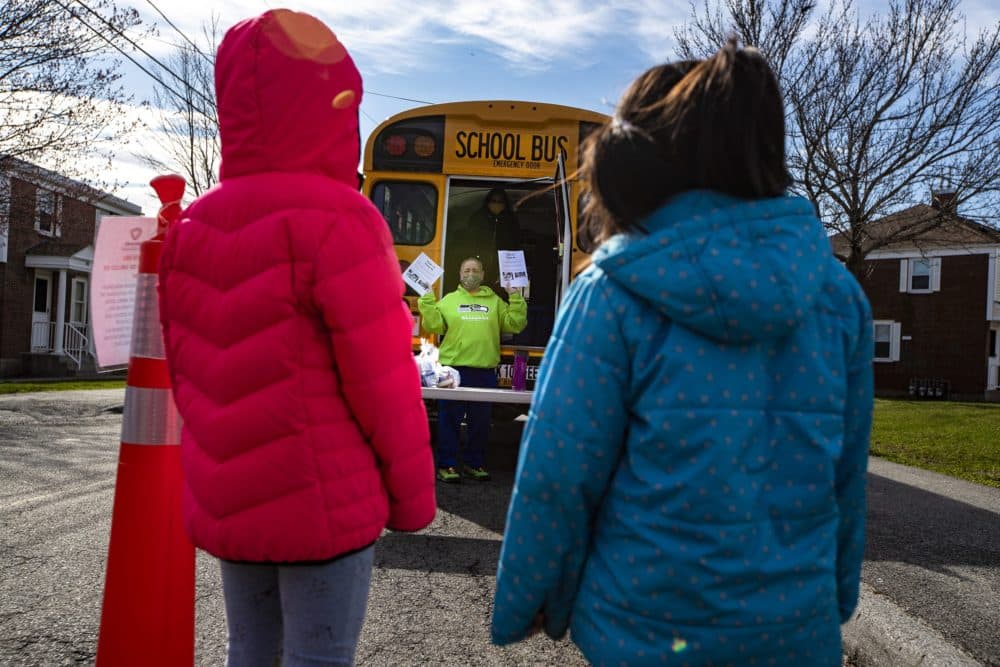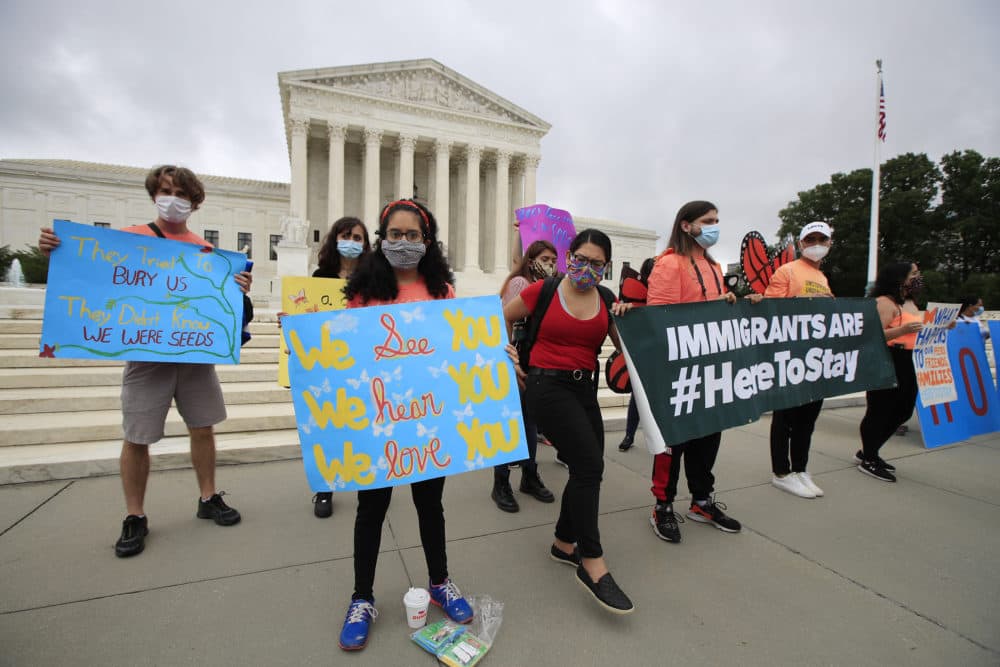Advertisement
How Biden's New Policies On The Pandemic, Education, And Criminal Justice Will Affect Mass.
We're almost one week into the Biden administration, and already there are a slew of changes. I mean, the president signed 17 executive orders in his first hours in office alone.
To help make sense of it all, we asked WBUR reporters to dig into key issues of importance to Massachusetts: what changes are (or may be) coming under the Biden administration, and what they're watching out for in the weeks to come.
This explainer was created as a special edition of WBUR's daily morning newsletter, WBUR Today. To get more of the news Boston is talking about, sign up here.
The Pandemic, with Carey Goldberg

Help is on the way. More federal help against COVID-19, that is. The Biden administration is seeking tens of billions of dollars to bolster vaccination, testing and other efforts to beat down the coronavirus, which have been largely left to the states. What to watch for in the coming weeks:
The Vaccine Rollout
- What’s up: The Massachusetts vaccine rollout is well into Phase 1, which includes front-line medical workers and long-term care, but the state is not exactly living up to its usual proud role as a leader in all things health care. According to the Bloomberg vaccine tracker, it has given 434,000 doses or just over six per 100 people. And it has used just over half of the vaccines delivered. Both those numbers are below the national average. The state says it will open up vaccines to all residents over 75 this Monday, and soon after to anyone over 65, which some other states have done already.
- The Biden factor: Biden says fighting the pandemic is his very top priority, and he’s aiming to see 100 million vaccines administered across the U.S. in his first 100 days.
- The coming weeks: From Gillette Stadium to local pharmacies, Massachusetts has been cranking to set up more vaccination sites. Assuming the Biden administration gets the $20 billion it’s seeking for a national vaccination program, the state can hope it will get federal help to maximize how many shots it can give. Other areas where experts say help is needed: sign-up tech, recruitment of vaccination workers and better information for vaccine-hesitant people.
More Testing
- What’s up: Testing remains a frustrating catch-as-catch-can exercise for many Massachusetts residents even now, nearly a year into the pandemic. Schools are just starting to use surveillance testing to watch for outbreaks, and rapid tests remain scarce.
- The Biden factor: Biden is calling for a $50 billion injection of federal cash and a new “Pandemic Testing Board” to strengthen and unify testing efforts.
- The coming weeks: The major testing push could translate into many more testing options for Massachusetts residents, including at-home tests and more rapid tests. Biden's plan also calls for all testing — whether you have symptoms or not — to be covered by insurance. That would be a major change.
Virus Variants
- What’s up: As COVID-19 evolves, concerns are rising about variants that appear to make it more contagious and potentially more virulent. One variant first detected in the U.K. has now been detected in Massachusetts.
- The Biden factor: New CDC chief Dr. Rochelle Walensky says efforts are under way to keep a better eye on how the virus mutates and the potential effects on how well vaccines and treatments work.
- The coming weeks: Researchers at the Broad Institute in Cambridge are among the leaders working to track virus mutations and their potential effects. Moderna is testing out a vaccine booster to protect against the highly infectious virus first detected in South Africa. And Biden has already issued a mask mandate for planes, trains and federal property; if more contagious variants spread, we may see a federal push for tougher restrictions – just as Massachusetts has begun easing measures like early closing hours.
The Economy, with Callum Borchers
There are several shifts slated to take place under the Biden administration. Among the highlights: kids could save you a bundle on taxes this year, and the corporate tax rate could go back up – but not all the way.
Tax Credits For Kids
- What's up: The standard tax credit for a child under 17 is $2,000. Remember that a credit — which reduces your tax bill, dollar for dollar — is better than a deduction, which reduces the portion of your income that is taxable. The credit is refundable only up to $1,400, however. So, if you have a toddler and owe $1,800 in taxes, for example, the child tax credit can get you off the hook, but Uncle Sam isn't going to send you the remaining $200.
- The Biden factor: The president's pandemic relief plan would temporarily raise the tax credit to $3,600 for children ages 0 to 5, and $3,000 for ages 6 to 17. Plus, the entire credit would be refundable. Using the previous example, a toddler could not only wipe out a $1,800 tax bill but also yield a $1,800 refund.
- The coming weeks: Biden's proposal to boost the child tax credit is just one piece of his sweeping, $1.9 trillion coronavirus stimulus package. The question now is how much of that plan can get through Congress.
Corporate Tax Rate Changes
- What's up: The centerpiece of former President Trump's 2017 tax reform was a dramatic reduction of the corporate tax rate, from 35% to 21%. Some businesses used the savings to pay one-time employee bonuses; fewer bumped up salaries.
- The Biden factor: The president campaigned on raising the corporate rate. Rather than propose a return to 35%, however, Biden pitched a midpoint between the new rate and the old one: 28%.
- The coming weeks: Recall that congressional Republicans used the budget reconciliation process to push through the Trump tax cuts. It was a maneuver that avoided the need for a filibuster-proof majority and enabled passage without a single Democratic vote. Now that Democrats control both houses of Congress, Biden could play the same game of hardball to advance his own tax agenda. But will he, given his stated focus on bipartisanship? An early indicator could be his approach to a new pandemic relief package. White House press secretary Jen Psaki was asked, in her first media briefing, whether the president might use budget reconciliation to pass another round of stimulus. "His clear preference is to move forward with a bipartisan bill. There's no question about it," Psaki said. "But we're also not going to take any tools off the table."
Education, with Carrie Jung

From naming a former public school teacher, Miguel Cardona, as education secretary, to extending the Trump era moratorium on federal student loan payments through Sept. 30, Biden has been busy this month. But one major goal of the Biden administration is helping more public schools reopen their physical classrooms to more students. Here's what it could mean for Massachusetts K-12 and early education.
K-12
- What's up: Districts across the state have been struggling to find enough funding and coordination to support activities like surveillance testing. Many school systems are also struggling to stay fully staffed when educators get sick or have to quarantine.
- The Biden factor: President Biden has released a plan to help schools beef up COVID-19 testing capabilities and accelerate the pace of vaccinations. His administration has asked Congress for $130 billion in additional school reopening assistance. Also, states can now apply to FEMA to be reimbursed for expenses like personal protective equipment and cleaning supplies used in schools. And when it comes to vaccinations, the Centers for Disease Control and Prevention has now categorized teachers as “essential workers.”
- Weeks to come: While it’s technically up to each state to determine how to prioritize its workers, most rely heavily on CDC guidance. In Massachusetts, educators are in part two of phase two, as of when we sent this email. And when it comes to the curriculum itself, we'll also be keeping our eyes on standardized testing. Cardona has not yet said if he plans to waive federal standardized testing requirements, but many states, including Massachusetts, are facing pressure to cancel.
Early Education & Child Care
- What's up: Child care providers are struggling to stay afloat because of the pandemic. According to a recent state survey, only 82% of licensed providers in Massachusetts have reopened since March.
- The Biden factor: As part of a larger economic stimulus package, the Biden administration is proposing a $25 billion emergency stabilization fund. That pot of money would be available to struggling child care providers as well as those that had to shut down. Biden is also proposing a $15 billion increase to the Child Care Development Block Grant, a program that helps low-income families access child care. The child care tax credit could also get a boost from this administration. Biden has proposed allowing families to recoup as much as half of their child care expenses.
- Weeks to come: These policy plans are just proposals at this point. Congress still has to weigh in. Some Republicans have already expressed their disapproval of Biden's stimulus package. However, some, like Sens. Susan Collins, of Maine and Lisa Murkowski, of Alaska, might be open to the plan.
Criminal Justice Reform, with Deborah Becker
Former President Trump signed into law one of the most significant changes to the federal criminal justice system in years. The First Step Act was considered a major step forward for criminal justice reform, but its implementation has been plagued with problems.
President Biden has promised several new criminal justice reforms that could affect local criminal legal systems. Among them, Biden said he wanted to improve police accountability; end cash bail and mandatory minimum sentences; reduce incarceration and divert those charged with nonviolent drug crimes to substance use treatment. Much of the federal influence on local policies will be limited to funding – or withholding it – based on reforms.
Police Accountability
- What's up: The 1994 Violent Crime Control and Law Enforcement Act, which Biden played a lead role in writing and which has been blamed for boosting mass incarceration, gives the Justice Department the authority to investigate alleged unconstitutional conduct by police. However, the Trump administration restricted the department's ability to pursue and enforce consent decrees with local police. The federal investigation of Springfield police was an exception. In July, the DOJ found the department's narcotics bureau "engaged in a pattern or practice of using excessive force."
- The Biden factor: Biden said he plans to investigate patterns of local police misconduct, which could ultimately create a set of standards for policing agencies around the country. Biden promised to reverse the restrictions placed on DOJ consent decrees and expand investigations. Biden's campaign also pledged to invest $300 million in the Community Oriented Policing Services (COPS) office that was established by the 1994 crime bill. That office provides funding to local police departments for hiring and training. The DOJ can require departments to report use-of-force data as a condition of federal funding. Currently, any data is provided voluntarily.
- The coming weeks (or months): Biden could push for a resurrection of the "Justice in Policing Act," which was introduced last year in the wake of the police killing of George Floyd. The legislation would establish a national use-of-force standard, make it easier to charge police with crimes at the federal level and establish a national registry of misconduct by law enforcement.
Incarceration
- What's up: Although local jails and state prisons across the U.S. account for about 90% of the nation’s incarcerated population, the federal government can implement policies that affect incarceration rates.
- The Biden factor: Biden has proposed a $20 billion grant program to motivate states to shift from incarceration to prevention. He has promised that local law enforcement agencies can receive funding if they agree to implement programs designed to keep people out of prison. Stipulations on funding include requiring states to eliminate mandatory minimums and creating earned credit programs for people incarcerated.
- The coming weeks (or months): It's not clear whether these funding requirements will be put in place immediately – or at all. Plus, there are still more orders being rolled out, including some coming as early as today that are expected to create a policing commission, reinstate the ban on transferring military equipment to local police and improve prison conditions.
Diversion And Drug Treatment
- What's up: The debate about forced drug treatment is particularly relevant to Massachusetts, which is believed to be the only state that uses jails and prisons to house those involuntarily committed to addiction treatment. Gov. Charlie Baker has expanded the use of correctional facilities for forced addiction treatment for men. The state no longer uses prisons for women's treatment because of a lawsuit.
- The Biden factor: During his campaign, Biden promised to end incarceration for drug use alone and divert individuals to drug courts and treatment. Several activists criticized the position, saying that drug courts are still punitive and often jail people who relapse.
- The coming weeks: As we deal with an overdose crisis amid the pandemic, eyes will be on Regina LaBelle, who Biden has chosen to become acting head of the White House Office of National Drug Control Policy, which coordinates the federal response to the addiction epidemic. LaBelle was chief of staff at ONDCP during the Obama administration. Most recently, LaBelle was distinguished scholar and program director of the Addiction and Public Policy Initiative at the O’Neill Institute for National and Global Health Law at Georgetown University. The mission of the initiative is "to advance a public health approach to substance use disorders and the opioid epidemic through legal and policy strategies that promote evidence-based treatment and recovery."
Climate Change and Environmental Issues, with Barbara Moran

President Biden got to work on day 1, re-entering the Paris Accord and killing the Keystone XL pipeline. He’s planning to sign more executive orders in the days ahead, but much of the tough work on climate change will be a long slog, and out of the spotlight. Here are a couple things to watch that will affect New England:
Offshore Wind
- What’s up: Vineyard Wind was supposed to be the first large-scale offshore wind project in the U.S. But after more than a year of federal delays and opposition from the fishing industry, the Trump administration pulled the plug on the project in December.
- The Biden factor: Biden has put a big stake in wind power. His climate plan set the goal of doubling offshore wind by 2030, and also touts good jobs for wind turbine technicians.
- The coming weeks: Everyone is watching the federal Bureau of Ocean Energy Management (BOEM) to see if they will give Vineyard Wind permission to begin construction. Vineyard Wind CEO Lars Pedersen expects they will, and told WBUR his project could be producing power by 2023. The fishing industry says offshore wind threatens their safety and livelihood, and is expected to fight back hard.
A Marine National Monument
- What’s up: In 2020, President Trump removed protections from the Northeast Canyons and Seamounts Marine National Monument, re-opening the nearly 5,000-square-mile area southeast of Cape Cod to commercial fishing.
- The Biden factor: Biden has ordered the Department of the Interior to review “the boundaries and conditions of several national monuments,” including this one.
- The coming weeks: Environmental advocates are urging Biden to reinstate the Monument’s protections, and it’s expected that he will. The issue is largely symbolic since there isn’t a ton of commercial fishing in the area anyway. But along with offshore wind (see above) the move could signal changing fortunes for the fishing industry, which saw Trump as a useful – if somewhat disinterested – ally.
Immigration, with Shannon Dooling

Hours after being sworn into office, President Biden signed a number of executive orders aimed at walking-back Trump's immigration policies. Let's take a look at some of the changes that could most impact residents in Massachusetts:
Enforcement Priorities
- What's up: Under Trump's administration, U.S. Immigration and Customs Enforcement (ICE) agents and officers were instructed to pursue anyone in the U.S. without legal documentation for removal. This was a sharp departure from the previous enforcement priorities during Obama's second term, when the focus was on deporting serious criminals.
- The Biden factor: President Biden revoked Trump's enforcement priorities by signing an executive order and calling on his administration to set new priorities that will "protect national and border security, address the humanitarian challenges at the southern border, and ensure public health and safety."
- The coming weeks: The Biden administration is expected to release new guidelines for civil immigration enforcement that, in the words of the order, "will reset the policies and practices for enforcing civil immigration laws to align enforcement with these values and priorities."
DACA
- What's up: Deferred Action for Childhood Arrivals (DACA) is an Obama-era policy allowing some immigrants brought illegally into the country as children to pursue schooling and work authorization with temporary and limited protections from deportation. About 800,000 recipients nationwide have been able to study and work in the U.S. — including about 8,000 in Massachusetts and close to 15,000 throughout New England. In 2017, Trump moved to dismantle the program, sparking a sprawling legal battle that culminated in June 2020 with the U.S. Supreme Court ruling Trump's legal maneuvering was faulty.
- The Biden factor: Biden further solidified the future of DACA on his first day in office when he signed an executive order calling on his administration to fortify and protect the program. This re-opens the process to new applicants in Massachusetts and across the country. Attorney General Maura Healey has estimated nearly 20,000 young people living here are eligible for DACA. A pathway to citizenship for DACA recipients is also included in Biden's plan for comprehensive immigration reform that he's already proposed to Congress.
- The coming weeks: That vision for immigration reform also offers a pathway to citizenship for people living in the U.S. with Temporary Protected Status (TPS). There are an estimated 12,000 TPS recipients living in Massachusetts, many of whom own businesses and homes and who have started families here. And it's not only DACA and TPS recipients who'll be closely watching the trajectory of immigration reform under Biden. The president's proposal also includes a new pathway to citizenship for the nearly 11 million undocumented immigrants living in the U.S. – marking perhaps the most stark departure from the Trump-driven immigration agenda. But this lofty piece of legislation certainly faces an uphill battle, even with a Democrat-controlled Senate.